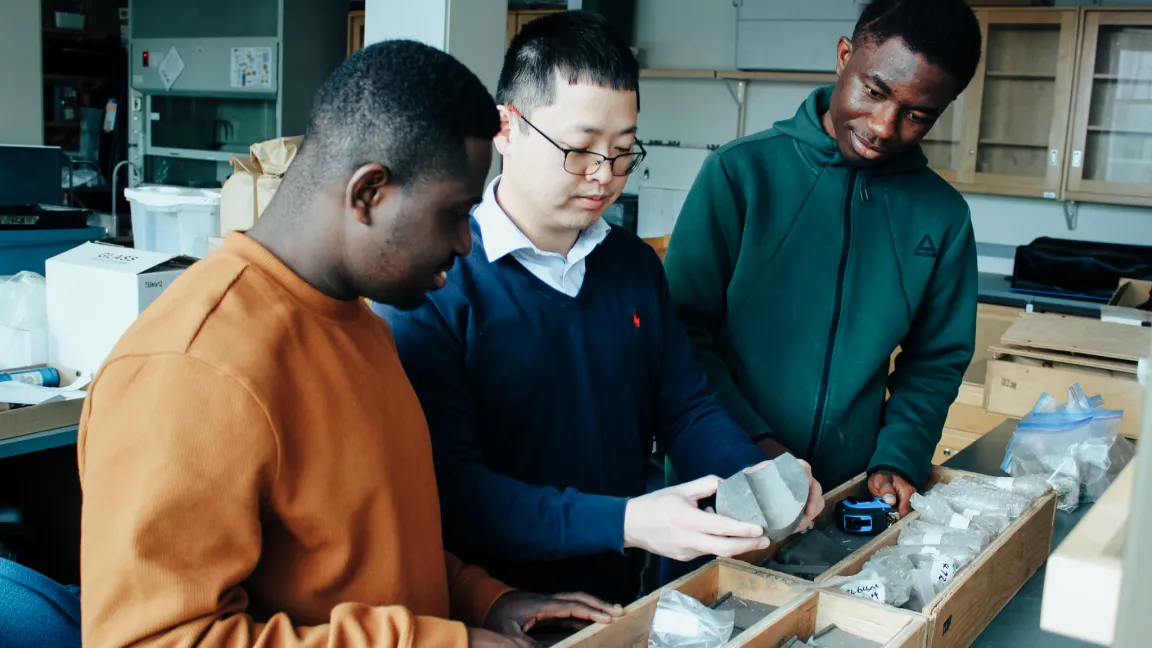UNBC researcher advancing understanding of safe, efficient natural resource extraction
New federal-provincial infrastructure funding supports the creation of a rock mechanics lab in UNBC's School of Engineering, furthering research on seismic safety and sustainable energy recovery.

Prince George, B.C. – UNBC researcher Dr. Wenbo Zheng has received $312,393 in federal-provincial funding to bridge knowledge gaps critical to addressing the challenges associated with the sustainable utilization of energy resources from deep within the earth.
Canada is one of the leading countries in utilizing energy resources from deep geological formations, such as unconventional natural gas, carbon geological sequestration and geothermal energy.
The School of Engineering Associate Professor is one of three UNBC researchers to be awarded matching grants from the Canada Foundation for Innovation’s (CFI) John R. Evans Leaders Fund and the B.C. Knowledge Development Fund (BCKDF), along with in-kind contributions from partners.
Earmarked for infrastructure, the funding will support Zheng’s ongoing research into the mechanical behaviours of rock formations subjected to engineered stimulations like hydraulic fracturing and injections as part of natural resource extraction.
“There is a lack of laboratory testing data on deep rock formations needed to develop the sophisticated numerical models that are critical to the safe and efficient utilization of energy resources in geological formations,” says the Engineering Associate Professor.
He points out that hydraulic fracturing has been known to contribute to micro-seismicity hazards, like the many small-scale earthquakes in northeastern B.C.
“This funding will provide a much-needed rock mechanics toolkit to bridge technical gaps in testing and modeling rock deformation, fracturing and conductivity,” says Zheng. “It will grow our ability to improve simulation design – the expected outcomes will directly contribute to improving the design of hydraulic fracturing, mitigating associated adverse effects such as seismicity and enhancing environmental and health protection.”
The CFI/BCKDF funding will create a rock mechanics laboratory at UNBC, adding a rock sample preparation system, rock testing systems and rock measurement systems to existing infrastructure acquired when Zheng was awarded a Natural Sciences and Engineering Research Council of Canada (NSERC) Research Tools and Instruments Grant in 2022. The elevated rock mechanics testing capacity will also support his ongoing NSERC research, including an international collaboration with a research team from Germany looking at improved hydraulic fracturing modelling of laminated shale in unconventional resource extraction.
Over the next five years, Zheng’s research will engage 10 undergraduate students, eight graduate students and10 exchange PhD students. In addition, this expanded research capacity will benefit other UNBC researchers involved in material testing.
“This research will strengthen both the province’s and Canada’s leadership in sustainable resource extraction and facilitate the adoption of emerging energy systems, such as carbon sequestration and geothermal energy,” says Zheng. “Helping Canada achieve its net-zero goal by 2050.”